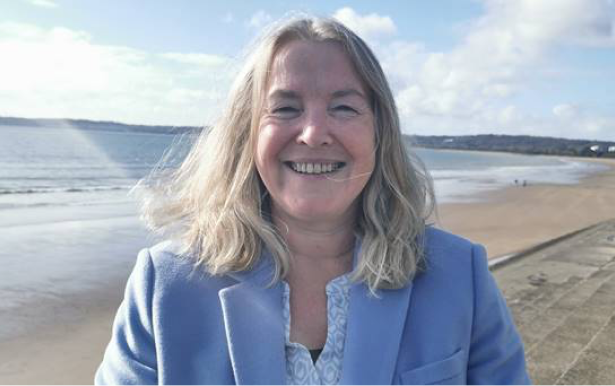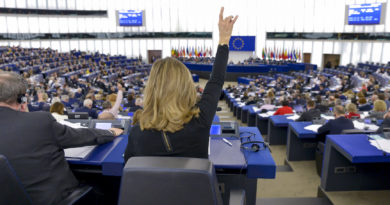What the independent authority on EU citizens’ rights can do for you: interview with CEO Kate Chamberlain
From January 1 breaches of the EU-UK withdrawal agreement related to the rights of EU citizens in the UK, and their family members, can be reported to the Independent Monitoring Authority (IMA).
The newly established Authority has been set up to monitor the rights of EU citizens who were living in the UK and Gibraltar before the end of the Brexit transition period.
Through its website it is now possible to submit complaints about the difficulties encountered with the settled status scheme and other residency procedures. Also in the spotlight, there will be issues related to social security benefits, the recognition of professional qualifications, and any form of discrimination. This was agreed as part of the UK withdrawal from the EU.
But what will the Authority do with such information, and what are its priorities and resources? Dr Kathryn Chamberlain, its interim Chief Executive Officer, gave an overview to Europe Street News.
Sponsored by the Ministry of Justice but independent in its operations, the Independent Monitoring Authority is based in Swansea, Wales. “Being based in a devolved administration helps to remind us daily that we have quite a broad geographical remit,” Dr Chamberlain says.
She has a history in the Welsh public administration, having been Chief Executive at the Healthcare Inspectorate and Chief Statistician and Head of Knowledge and Analytical Services for the Welsh Government.
With 65 staff, including complaint management, legal and supporting services teams, the Authority will produce an annual report for the joint committee on citizens’ rights set up under the withdrawal agreement. Under the deal, its work will have to continue at least until the end of 2028.

‘Engaging directly with EU citizens’
The first priority of the Authority, Dr Chamberlain says, is to make sure that “systems are in place” so that EU citizens can report problems they run into when dealing with UK public administrations. It is also important to “find a way to engage directly” with EU citizens, she adds.
There are no firm plans yet on how to hear their voice directly, but options in consideration include surveys, a general call for evidence inviting people to “share their experiences”, the creation of advisory groups or other consultative mechanism, Dr Chamberlain says. The aim is to ensure that “real experiences and real people… underpin the work of the Authority”.
The other priority is to start thinking about the enquiries to launch. The Authority has the power to undertake enquiries based on the complaints it receives, by own initiative or following the request from a Secretary of State, Scottish Minister, Welsh Minister or Executive Office in Northern Ireland.
Since in the early days there won’t be enough information generated from the complaints, the Authority will probably consider “broad evidence” from public administrations and citizens’ rights groups for its first enquiry.
How to report problems
Breaches of rights can be reported via the website https://ima-citizensrights.org.uk/. People have to answer some questions to understand if what they are reporting is in the scope of work of the Authority. If so, they will be invited to the complaint system to provide details about the problem.
The staff will then check that the complaint provides sufficient information and will test it against data deriving from other complaints or public bodies, Dr Chamberlain explains.
“Every complaint will be considered,” she says. “We will consider them to work out whether they might be indicative of something systemic or general that might be impacting upon a number of people, and we will be looking for clusters and patterns in these complaints”.
The next step might be “a dialogue with the public body concerned” telling them there is a problem and inviting a response. This could lead to an early resolution of the issue, continues Dr Chamberlain. “So even those complaints that do not make it as far as an enquiry may be used to prompt early action by public bodies,” says the chief executive.
The challenge for the Authority, however, will be “getting to the root cause” of the problem, Dr Chamberlain adds. For instance, people may feel they have been discriminated in their access to employment because employers ask documents they don’t have or information they do not feel they should provide. In such case, the Authority will have to determine whether the problem is “about employers not understanding how the rights should be applied or the ability of the individual to access the documentation needed,” she says.
One thing to be aware of is that the Authority’s monitoring responsibility concerns only public bodies, not private entities such as employers or landlords. “However,” Dr Chamberlain continues, “the question then becomes if landlords or employers are acting in a way contrary to the rights and what public bodies are doing about it”.
The Authority is also tasked to keep the “legislative framework under review,” which potentially includes “powers for action to be taken regarding service providers of housing or employment, for instance”. The Authority can also recommend a clarification or a review of relevant legislation.
‘Not a complaint-handling body’
Dr Chamberlain stresses that the Authority is not set up as a complaint-handling body.
EU citizens already have the power to report their complaints directly to the concerned bodies and to appeal if they are not happy with the outcome. “We do not replace any of those existing powers. We are an additional layer for EU citizens who can look at general systemic issues that might be worthy of further investigation,” she says.
The chief executive admits it may be difficult to communicate such message to people who are “energized and potentially distressed” enought to report a problem and “would hope to get redress and resolution”.
However, she adds, “sometimes we underestimate the desire of people to fix the system, to start from a premise that what happened to me is simply unacceptable and… should not be allowed to continue”.
But individuals who complain will be invited to take part in the relevant enquiry, if it is launched. In addition, should an enquiry be pursued, the Authority has to publish its intent and a call for evidence encouraging others to report their circumstances.
At the end of the process, the Authority will publish a report which is likely to contain “a number of recommendations to a particular body”. That body will be required to respond and “commit to doing certain things by certain times,” Dr Chamberlain explains.
The Authority will then “have a role to make sure that they have done what they said they’d do” and assess whether the action “has had the intended effect”.
As a last resort, the Authority can pursue legal action, an option that might not be used frequently, Dr Chamberlain says, but could be decided if there isn’t enough “traction from the bodies concerned”.
‘Open and transparent’
To begin its work, the Agency has already made contacts with the public administrations it will monitor across the UK and in Gibraltar, with representatives of organisations working with EU citizens, such as the3million and the Citizens Advice Bureau, as well as with embassies, the EU delegation to the UK and EU institutions in Brussels, Dr Chamberlain says.
A key challenge for the new watchdog will be to gain the trust of EU citizens, many of whom are disillusioned after having been defined “bargaining chips”, “citizens of nowhere” and “queue jumpers” by top UK politicians since the Brexit referendum. The precedent of the Windrush scandal has also undermined the confidence on the UK ability to uphold its commitments in the long term.
“Trust comes from behaviours,” Dr Chamberlain says. “You can build the infrastructure and the rules and put the governance in place to demonstrate that we are an independent and objective body, but it is only in the way that we deliver our functions that we can truly build trust”.
She promises “openness and transparency”, and honesty about the strengths and limitations of the Authority. Part of that effort will consist in considering not only if the agency is “doing what it is set up to do,” but if it is “making any difference,” she adds.
Dr Chamberlain admits “there is a danger for an organisation dealing with “systemic and general issues” to “become focused on process and not on people.”
“We need to make sure that we understand the impacts that the issues we are looking at have on individuals and that’s why we encourage people to share their concerns. We need to understand what those are,” she says.
As a final message to EU citizens, she says: “The Independent Monitoring Authority has been set up to monitor and promote the effecting implementation of your rights in the UK after the end of the Brexit transition. Get in touch and tell us where there might be issues that you want to make us aware of.”
Claudia Delpero © all rights reserved
Top image: sunset in Wales by Anthony Wright from Pixabay
Europe Street News is an online magazine covering citizens’ rights in Europe. We are fully independent and we are committed to providing factual, accurate and reliable information. We believe citizens’ rights are at the core of democracy and information about these topics should be accessible to all. This is why our website and newsletter are available for free. Please consider making a contribution so we can continue and expand our coverage.





